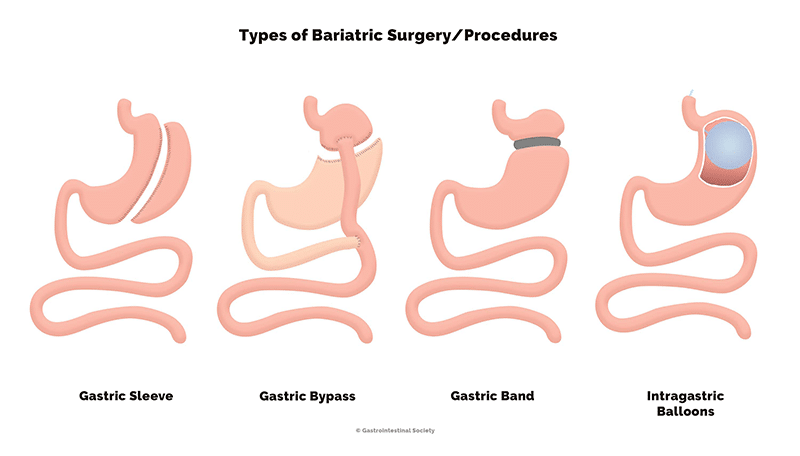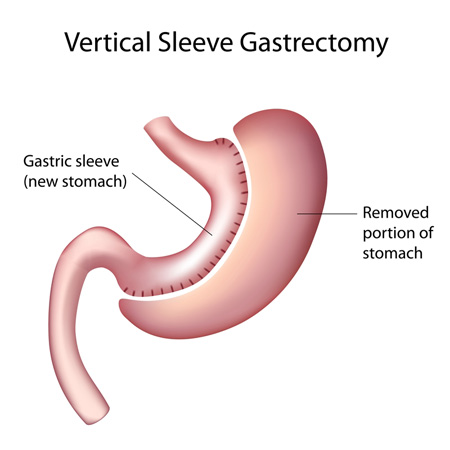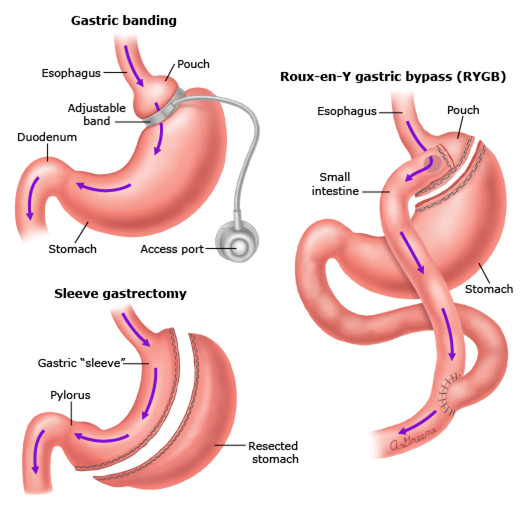How To Qualify For Bariatric Surgery
Bariatric Surgery
If you're thinking about weight-loss surgical treatment, you're not alone. According to the American Society for Metabolic and Bariatric Surgical Treatment, over 250,000 individuals in the United States went through weight-loss surgical treatment in 2017. There are numerous factors to think about before choosing if weight-loss surgical treatment is right for you. In this post, we'll cover whatever you require to understand about bariatric surgical treatment, from the advantages and risks to the different kinds of surgery and what to anticipate prior to and after. We'll likewise address a few of the most frequently asked questions about weight-loss surgical treatment.
Is Bariatric Surgery Right for Me?
If you are more than 100 pounds obese and have health issue that relate to being overweight, surgery may be right for you. In order to get approved for bariatric surgery, you need to fulfill two criteria. Your weight needs to be more than 100 pounds above your ideal body weight. Second, the illness caused by being obese need to be present. If you are overweight but do not have diabetes or high blood pressure, surgery may not be the best choice for you. After your procedure it is important to take a bariatric multivitamin to to maintain your health.

Different Types Of Bariatric Surgery
After undergoing surgery, it is necessary that you make lifestyle changes, such as reducing calorie intake and increasing physical activity. If these modifications are made and kept in time, many people see considerable improvements in their health. Some people do experience obstacles after surgery, such as gaining back weight they lost due to a lack of inspiration or energy to keep their new way of life practices. If this occurs to you, please look for assistance from your cosmetic surgeon or therapist.
The Benefits of Bariatric Surgery
If you are overweight or obese, bariatric surgical treatment may be a choice for you. Bariatrics is a type of surgery that assists people lose weight by lowering the size of their stomach. There are numerous advantages to having this surgical treatment, a few of that include:
- It can help you reduce weight.
- Lower your blood sugar level levels.
- Aid improve your cholesterol levels.
- Reduce your risk of cardiovascular disease.
Side Effects Of Bariatric Surgery
People who have bariatric surgery frequently feel better and look healthier than previously. The surgery can help you reduce weight in a healthy way, which is very important because diet and exercise alone often aren't enough to achieve long-term weight-loss. Furthermore, bariatric surgical treatment can help enhance your cholesterol levels and lower your threat of cardiovascular disease. In general, the benefits of bariatric surgical treatment are numerous and substantial.
The Threats of Bariatric Surgical Treatment
Bariatric surgery is one of the most popular kinds of surgeries on the planet. Like any type of surgical treatment, there are risks associated with it. This article will check out a few of the risks involved with bariatric surgical treatment and why they should be thought about prior to deciding to have it carried out. You will also need to follow the bariatric diet plans that were provided to you by your doctor or nutritionist.


Late Complications Of Bariatric Surgery
First and foremost, bariatric surgery is not for everyone. It is essential to understand that this treatment can result in many different health issues, both short-term and long-lasting. Weight problems can lead to a number of health problems such as high blood pressure, heart illness, stroke, diabetes, and more. In addition, bariatric surgical treatment can trigger significant modifications to your digestive system which could be troublesome in terms of your total diet and nutrition.
Lastly, it is important to understand all the risks included before choosing whether bariatric surgery is right for you. Just after understanding all the possible dangers will you have the ability to make an informed decision about having this procedure done.
Self-Pay Insurance That Covers Bariatric Surgery
The Types of Bariatric Surgery
When it comes to weight-loss surgery, there are a range of choices offered. This article provides an overview of the different types of bariatric surgery and how they can assist you reduce weight.
Gastric bypass is the most commonly carried out type of surgical treatment. It includes eliminating part or all of your stomach and rerouting it so that it no longer helps with digestion. The benefits of this surgery consist of minimized weight gain gradually, in addition to enhanced blood glucose levels and cholesterol levels.
Sleeve gastrectomy is another popular option for weight reduction surgical treatment. In this procedure, part or all of your stomach is eliminated, leaving only a small section called the sleeve around your jejunum (a part of your small intestine). This restricts the amount of food that can be eaten at one time, which can lead to rapid weight reduction. In addition, sleeve gastrectomy might likewise lower the danger for obesity-related illness such as cardiovascular disease and diabetes.
Mini gastric bypass is a less invasive variation of gastric bypass that is often suggested in people who have not reacted well to other kinds of weight-loss surgical treatment. Tiny gastric bypass includes developing a smaller stomach pouch by removing some tissue from around the top area of your stomach (the fundus). This reduces the amount of calories that are taken in from food during digestion, resulting in quick weight loss results.
Duodenal switch is another less common however still efficient choice for weight reduction surgery. In duodenal switch surgical treatment (DS), part or all of your small intestine is eliminated and changed with a synthetic tube called a stent. This enables more fuel and nutrients to be absorbed from food than would usually be possible, which causes rapid fat loss outcomes.
How To Qualify For Bariatric Surgery

Post Bariatric Surgery Meal Plan
How to Prepare for Bariatric Surgical Treatment
If you are considering bariatric surgical treatment, there is a lot you require to know. In this post, we will talk about the value of surgical treatment and what to expect throughout the treatment. We will also offer tips on how to prepare for surgical treatment and go over the threats and possible problems connected with the surgery. Lastly, we will use some words of encouragement in preparation for your journey ahead.
How Much Is Bariatric Surgery
Bariatric surgical treatment is a really crucial step in managing obesity and its involved illness. It can assist you drop weight, enhance your cholesterol levels, and minimize your threat of diabetes. The main advantages of bariatric surgical treatment are that it is safe and has couple of complications. Nevertheless, there are some things that you need to know prior to you decide to have the surgical treatment. We will discuss these in detail below.
If you are thinking about bariatric surgical treatment, it is essential to comprehend the advantages and threats involved. Surgery is a safe procedure with few problems, however there are some things that you need to know ahead of time. To begin with, bariatric surgical treatment can assist you drop weight rapidly and securely. Second, bariatric surgical treatment can improve your cholesterol levels and reduce your threat of developing diabetes in time. Third, many individuals report sensation much better after having bariatric surgery-- both emotionally and physically. 4th, while the dangers connected with the procedure are reasonably small (e.g., infection), they ought to be gone over with your doctor before deciding about having the operation.
Bariatric surgery is a procedure that weight reduction surgeries use. It uses different approaches to lower or get rid of fat from specific areas of the body (such as the stomach), which can cause significant weight loss gradually. There are numerous various types of bariatric surgical treatments readily available, they all share some common functions: they all need basic anesthesia; they all trigger major health changes (both short-term and long-lasting); and they all carry risks associated with any major surgical treatment.
Prior to choosing if bariatric surgery is right for you, it is very important to understand how much weight you wish to lose and your physical fitness goals. Usually speaking, people who have bariatric surgery usually lose anywhere from 50% to 100% of their excess weight-- though specific outcomes may differ rather depending upon the particular treatment chosen. There is no "perfect" amount of weight that somebody ought to lose before going through surgical treatment; rather, your objective ought to be to achieve a healthy bodyweight in accordance with your own physical abilities and restrictions. Even after completing an effective surgical treatment program, there may still be variations in your weight due to varying hormones or food intake/losses within your overall diet/activity levels, etc. Now those changes will likely take place within healthy ranges rather than outside them, potentially leading to more serious health repercussions down the road, such as type 2 diabetes.
